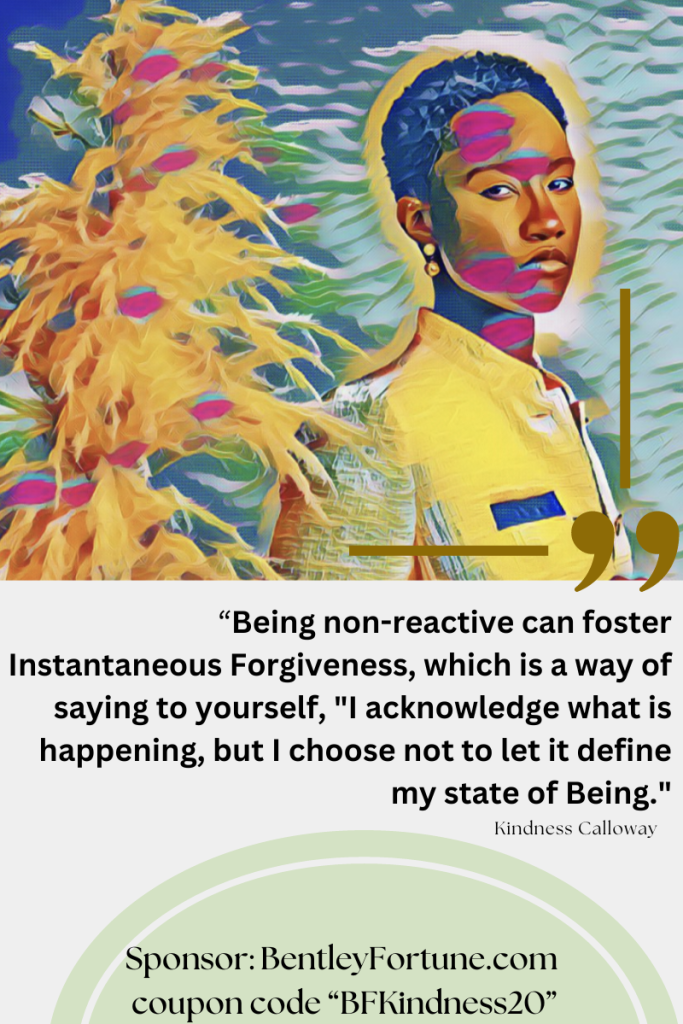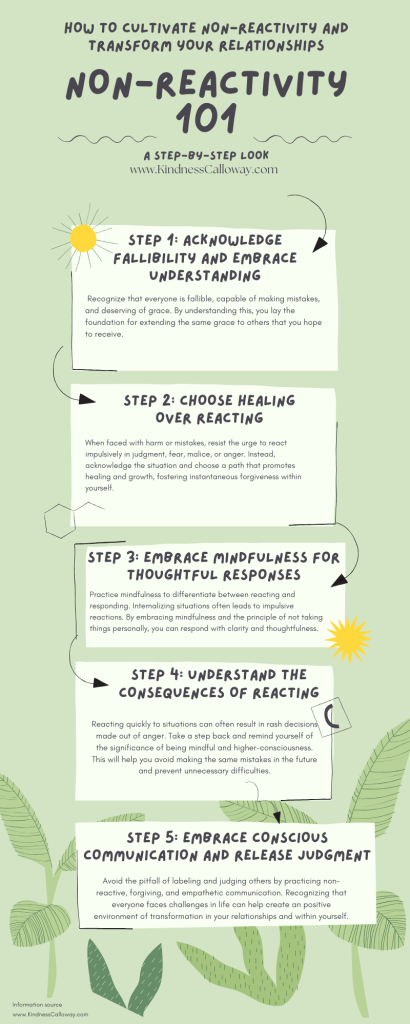When we recognize that everyone is fallible and capable of making mistakes, it becomes easier to extend the same grace and understanding to others that we hope to receive ourselves. And by keeping this in mind, it helps us to not react in the moment when someone is actively harming us. This doesn’t mean ignoring the hurt or pretending that the mistake didn’t happen, but rather acknowledging it and choosing to move forward in a way that promotes healing and growth rather than mirroring those harmful behaviors and acting in judgment, fear, malice, or anger.
Being non-reactive can foster Instantaneous Forgiveness, which is a way of saying to yourself, “I acknowledge what is happening, but I choose not to let it define my state of Being.”
Mindfulness allows us to respond and not react. Embracing the principles discussed in the four agreements, including the agreement to not take things personally helps as well. When we react impulsively it can often stem from a tendency to internalize situations (taking things personally).
By practicing mindfulness, we can avoid personalizing external events, allowing us to respond with clarity and thoughtfulness instead of reacting.

Why Reacting Hurts
Reacting quickly can lead to making decisions in anger, which often aren’t the best choices. Sometimes we let things build up until we explode, thinking we deserve to act that way after enduring so much. But then why do we feel guilty later if we were truly justified? We’ve all been there. Being mindful and Christ-Conscious can help us to avoid repeating such mistakes.
Jesus said, “Do to others as you would have them do to you.” (Luke 6:31)
Basically, when we make a mistake we want quick and easy forgiveness. We’d prefer if our mistakes were just forgotten and never brought up again right? Understanding that life is challenging for us ALL in some way can help you understand that whatever is happening in the moment, is not personal. By releasing the judgment and the need to “label” everything, you can also live a life that is liberating.
Shaping Relationships with Self-Fulfilling Prophesies
For instance, you might have a partner whom you’ve described as “inattentive,” and consequently, when he seems distracted during conversations or interrupts you with numerous questions while you’re sharing a story, you quickly label his behavior. Before you know it, you’re constantly labeling everything and searching for new, more fitting terms to attribute to him. But in reality, you’re not comfortable with the behavior, so by labeling it and discussing it, you’re drawing it closer to yourself and your relationship. You call him absent-minded, and as a result, the Divine Inner voice within you manifests this reality. Scientists refer to this as the self-fulfilling prophecy; nonetheless, the principle is a fundamental law of the Universe that remains unchanged, which is that you have what you say (or you attract what you speak).

Life and death are influenced by the words we speak, and so when you go around labeling your partner as inattentive or lazy or any other negative label stemming from misguided thoughts, this label, this judgment, becomes Truth and eventually your reality, which you then have to live in.
It’s also important to bear in mind that by not taking things personally, you can consider that your partner’s inattentive behavior might be attributed to something else. Do you remember the incident he told you about when he was playing football and got hit on the head, losing consciousness for a few moments? Such experiences can impact the brain and attention levels. Additionally, any mental health issues your partner has confided in you about should be taken into account. Has he shared any past traumas with you? It’s been reported that one in six men have experienced abuse, and some say the numbers are even higher. If he’s ever disclosed something like that to you, it could also significantly affect his ability to focus; he might be dissociating, or there could be a multitude of other factors at play. This is just an example of course and everyone is different, however, no matter what the situation is, it’s crucial to respond without judgment and instead address your partner with something like, “I’ve noticed you seem to zone out when I’m speaking, is everything okay? Can we talk about it? It makes me feel….”
This approach, being non-reactive, forgiving, and non-judgmental, possesses the power to transform your life and your relationships for the better, allowing you to experience internal freedom and release yourself from the burden of others’ actions.
Click “Download below” to download a your free summary Infographic provided to you by Kindness Calloway
